Home / Projects
On September 27, 2024, Treescape Planet Organization, in collaboration with Samasource Uganda (https://www.sama.com/), launched the Sama Green Tree Planting Initiative at East Kololo Primary School, Kampala. This event marked a pivotal moment in promoting environmental sustainability and community engagement in Uganda.
The initiative, part of Samasource’s global CSR efforts, focuses on combating deforestation, biodiversity loss, and climate change through active tree planting and environmental education. Over 150 native and fruit-bearing trees were planted by pupils, teachers, Samasource employees, and local community members, fostering a sense of ownership and responsibility for the environment.

Key achievements include:
As we look ahead, the Sama Green Initiative will expand to more schools, with a focus on ensuring the long-term survival of planted trees and engaging local communities in tree care. Future phases of the project include regular monitoring, reporting, and forging additional partnerships to scale the initiative across Uganda.
This initiative serves as a model for how partnerships between NGOs, corporations, and communities can drive impactful, sustainable change.

Join Our Corporate Sustainability Movement
At Treescape Planet, we believe that collaboration is key to making a lasting impact. The Sama Green Tree Planting Initiative is just the beginning of our commitment to environmental sustainability, and we’re inviting more corporate partners to join us in this journey. By becoming a part of our Corporate Sustainability – CSR Partnership Program, your organization can actively contribute to environmental conservation, foster community engagement, and help tackle climate change in Uganda.
We are seeking corporate partners who are passionate about driving positive change and looking to integrate sustainability into their CSR efforts. Together, we can make a meaningful difference, one tree at a time.
Ready to Get Involved?
Join our partnership program today and be part of the solution for a greener future.
On October 26th, 2024, Treescape Planet hosted an impactful event in Gombe, Uganda, aimed at promoting sustainable tourism, empowering women smallholder farmers, and fostering environmental stewardship among the youth. This tree-planting initiative not only contributed to environmental conservation but also strengthened our ongoing commitment to building resilient communities through education and action.

The event kicked off with a community gathering of local women farmers, students, and volunteers, who came together to plant over 1,000 native and fruit tree saplings in the surrounding areas of Gombe Secondary School. The tree-planting activity was part of our broader mission to restore ecosystems, enhance biodiversity, and engage the local community in climate action. The event was designed to empower women smallholder farmers by providing them with the knowledge and resources to lead sustainable agricultural practices while supporting students in their journey towards environmental advocacy.
Before the tree planting commenced, the day featured insightful training and awareness sessions for both women farmers and students. Over 30 women smallholder farmers received practical training on sustainable farming techniques and climate-smart agriculture, which will help them improve their resilience to climate change while enhancing their agricultural productivity. In addition, 300 students from Gombe Secondary School participated in educational sessions on sustainable tourism, reforestation, and the importance of preserving natural resources.
These sessions were an integral part of the event as they empowered participants to take ownership of their environment and become advocates for sustainable practices in their communities.

The success of the event was due to the collective effort of local leaders, community members, and corporate partners. We are deeply grateful for the contributions from our sponsors, including Sama Source, Stanbic Bank, Centenary Bank, Active Gorilla Safaris, and Roofings Uganda Limited, whose support made the event possible.
Through these partnerships, we were able to provide much-needed resources, such as tree saplings, tools, and educational materials, which were key to the event’s success. The collaborative spirit of the event embodied our shared commitment to creating a more sustainable and eco-conscious community.
We are excited to announce that the Gombe Plant a Tree initiative was recognized at the prestigious Uganda Marketing Excellence Awards (UMEAs), which were held on Friday, 13th December 2024, at the Kampala Serena Hotel under the theme “Promoting Sustainable Marketing.” This recognition was awarded in acknowledgment of our innovative efforts in promoting sustainability through grassroots initiatives that engage local communities and contribute to environmental conservation.
The UMEAs have long been known for celebrating exceptional marketing campaigns that drive social good and environmental change. To receive such an accolade reinforces the positive impact of the Gombe tree planting event, as well as our commitment to fostering a sustainable future for Uganda. The award highlights our innovative approach to integrating environmental responsibility into our marketing and community outreach efforts.
This award also exemplifies the importance of collaboration between businesses, local communities, and organizations to promote sustainable practices while also showcasing the role of marketing in spreading awareness and encouraging action for the planet.
While the October 26th event was a significant milestone, it is only the beginning of a larger vision for Gombe and the surrounding communities. Moving forward, we plan to:
We will continue to offer training sessions for smallholder farmers, focusing on advanced techniques in sustainable agriculture, tree care, and climate resilience.
We aim to establish environmental clubs in Gombe Secondary School to keep the momentum going, providing students with opportunities to engage in ongoing conservation activities and learn about sustainability in a hands-on way.
Regular monitoring and maintenance of the trees planted during the event will be a priority to ensure their growth and longevity, contributing to the long-term health of the local ecosystem.
We will continue to engage local businesses, government officials, and international partners to ensure the sustainability of the project and explore further opportunities for collaboration and funding.
As we look to the future, we invite you to join us in our mission to empower communities and protect the environment. Whether through donations, volunteering, or spreading the word, your involvement can make a difference in the lives of women, youth, and the planet.
If you’d like to support our continued efforts to foster sustainability in Gombe, we invite you to donate to the project. Your contributions will help us expand the program, plant more trees, and continue educating future generations about the importance of environmental stewardship.
Click here to donate and support Treescape
Together, we can create a greener, more sustainable future for Gombe and for the world.
We would like to extend our heartfelt thanks to everyone who made this event possible—our volunteers, partners, community members, and the dedicated individuals who made the day unforgettable. This event was a powerful reminder that when we come together, we can create lasting change.
The Climate Justice Camp held on 1st-2nd July 2023 in Mbale City, Eastern Uganda, marked a pivotal moment in engaging young people in the climate change conversation. Organized by the Climate Justice Club Uganda in collaboration with Treescape Planet Organization, the camp aimed to empower young change-makers and increase awareness about climate change responsibilities.
Objectives Achieved:
Key Activities:
Schools Attended:
Testimonials:
Precious, (Student Headgirl): “The Climate Justice Camp truly opened my eyes to the urgency of climate action. Witnessing the transformation of our school grounds with beautiful trees and a more sustainable environment, I now feel empowered to drive change in my community and advocate passionately for sustainable practices.”
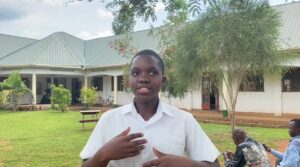
Moses, (Headmaster): “As the headteacher of our school, I commend initiatives such as the Climate Justice Camp for actively engaging young people in the battle against climate change. Witnessing the next generation step up to safeguard their future is truly inspiring. Given the vulnerability of our region to climate change impacts, the trees planted during the camp will play a vital role in preserving and nurturing our environment.”
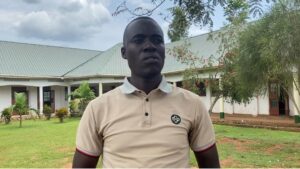
Wataka Alex (Deputy Head Teacher): “The camp served as a wake-up call for our students, igniting a sense of responsibility towards addressing climate change. We extend our gratitude to the organizers for empowering our youth through this initiative. As a school, we are committed to nurturing the trees planted, firmly believing in the mantra ‘plant a tree, plant a life’.”
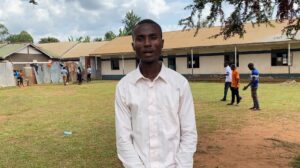
Pauline, Headgirl (Student): “The Climate Justice Camp opened my eyes to the impacts of our actions on the environment. Now, I’m dedicated to advocating for sustainable choices and inspiring others to join me. It also instilled in me the belief that planting a tree is not just about adding greenery but nurturing life itself, and I am determined to carry that forward.”
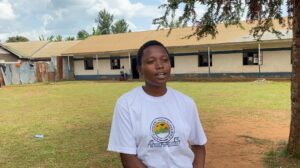
Mr. Collin (School Director): “The Climate Justice Camp offered our students a transformative experience and opened their eyes to the realities of climate change. Seeing the practical lessons firsthand, particularly the significance of trees as windbreakers, has instilled a sense of urgency in us. Given our recent loss of a school block to strong winds, we’re fully committed to nurturing the newly planted trees as a testament to our dedication to cultivating a greener, more resilient environment.”

Mulondo Sharif Hamis (Student): “The visit from the camp organizers was truly a landmark occasion for our school, marking a new chapter in our environmental journey. It has sparked a fire within me to pursue climate activism. The profound lessons on environmental preservation have given me a sense of empowerment, and I am now driven to effect positive change in my community.”
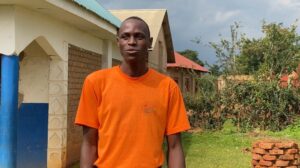
Gerald Eluju (Teacher): “As we transition into a new curriculum where climate change is now introduced, the Climate Justice Camp has been instrumental in bridging the gap between theory and practice for our students. Through hands-on activities like tree planting, they have been able to not only learn about climate change but also actively engage with the pressing issues of deforestation, landslides, and more. Witnessing their enthusiasm and commitment to environmental stewardship has been truly empowering.”

Salimo David (Student): “The camp was a pivotal moment for me. I’ve realized the urgency of tackling climate change, and I’m determined to promote sustainable practices in my school and community. Planting trees has been a tangible action we’ve taken, contributing to cleaner air. Let’s embrace the club and anticipate the positive impact it will bring.”

Emmanuel (Teacher): “The Climate Justice Camp was a transformative experience for our students. Our school being in the landslides region, it’s a blessing for our students to have gained valuable insights into climate change and were inspired to become agents of change in their communities.

Asiraf Mustapha (Student): “The camp opened my eyes to the reality of climate change. I am now motivated to take action to protect our environment and ensure a sustainable future for generations to come. With the many climate change effects happening, we appreciate the organizers for the efforts to see our climate getting back to normal and encourage everyone to plant more trees.
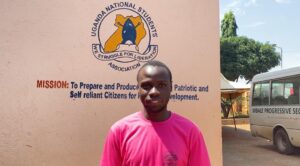
Conclusion:
The Climate Justice Camp not only educated participants but also inspired them to take concrete steps towards a sustainable future, demonstrating the power of youth engagement in addressing global challenges.
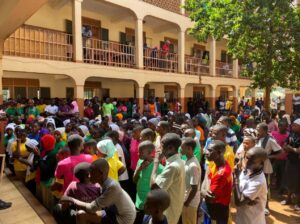
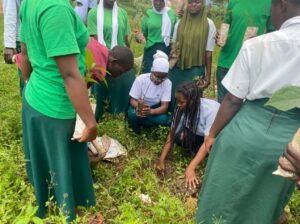
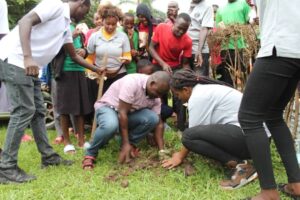
Growing Together is a transformative initiative by Treescape Planet Organization aimed at fostering environmental awareness and social inclusion. Through inclusive tree planting, the project empowers children with special needs while engaging the broader community of local leaders, and social organizations to maximize reach in environmental stewardship. The project’s goals are threefold: to provide inclusive environmental education, promote social integration, and instil a sense of environmental responsibility.
Partnering with organizations; Angel’s Center for Children with Special Needs and Clarke International University, the project addresses the pressing need for accessible education and social inclusion for children with special needs in the Wakiso district, Central Region of Uganda. By planting native and fruit trees and conducting interactive workshops, Growing Together not only enhances environmental conservation efforts but also breaks down social barriers, fostering a sense of belonging among participants.
Key Achievements:
Future Plans
Inspired by its success, the project partners plan to expand the environmental education program, conduct more inclusive events, and continue the tradition of tree planting. The long-term commitment to sustainability ensures that the project’s impact extends far beyond its initial phase, creating lasting change in the community.
Acknowledgements:
The success of Growing Together would not have been possible without the dedication and support of participants, partner organizations, volunteers, and sponsors. Their contributions have been instrumental in achieving the project’s goals and paving the way for future endeavours aimed at creating inclusive and environmentally responsible communities.
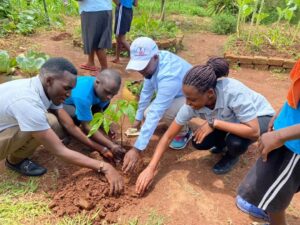
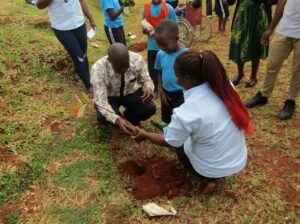
Treescape Planet embarked on the #GreeningNakaseke project in Nakaseke district, Uganda, with the aim of promoting afforestation, agroforestry, and re-afforestation among farmers and school-going children. Through a series of activities including awareness creation, tree planting, training of farmers, and information sharing, the project sought to empower communities while upholding the principles of sustainable development.
Nakaseke International College, Nakaseke Technical Institute, and Nabbika UMEA P/S were the focal points for extensive tree-planting endeavours. Activities included awareness creation sessions, active student participation in tree planting, and integration of environmental education into the curriculum.
The success of the #GreeningNakaseke project was made possible through the collaborative efforts of partners, sponsors, and the local community. Their support and dedication have laid the foundation for a greener and more sustainable future in Nakaseke district.
“Before the #GreeningNakaseke project, I never realized the importance of planting trees on my farm. Now, after receiving training from Treescape Planet, I understand how trees can improve soil health and provide additional income through fruit sales. I am grateful for the knowledge and support I’ve received.”
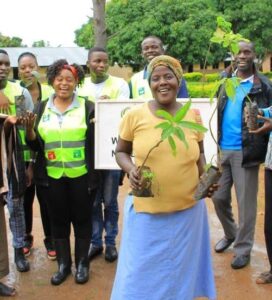
“As a small-holder farmer, I used to struggle with soil erosion and low crop yields. Through the #GreeningNakaseke project, I learned about agroforestry techniques that have transformed my farm. By planting trees alongside my crops, I’ve not only improved soil fertility but also diversified my income sources. Thank you, Treescape Planet, for empowering farmers like me.”
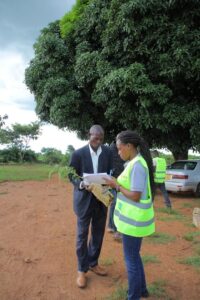
“The Greening Nakaseke project has been a game-changer for me and my family. Learning about the benefits of tree planting and agroforestry has not only improved our farm’s productivity but has also enhanced our environmental consciousness. We now see ourselves as stewards of the land, thanks to the invaluable training and support provided by Treescape Planet.”
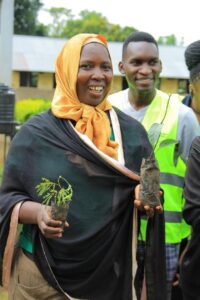
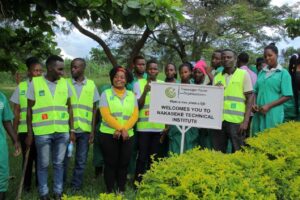
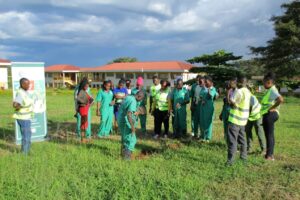
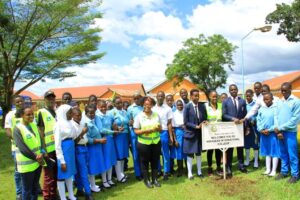
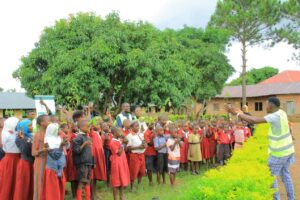
In July 2023, Treescape Planet Organization embarked on the transformative Kasumba Project at Kasumba Nursery and Primary School in Mubende, Uganda. This initiative aimed to instil environmental consciousness and stewardship among students and the community.
Objectives:
Challenges:
Solutions:
Impact:
Legacy:
Conclusion:
The Kasumba Project exemplifies the transformative potential of environmental education and community engagement. Through collaboration and empowerment, Treescape Planet Organization has nurtured a generation of environmental stewards, paving the way for a greener, more sustainable world.
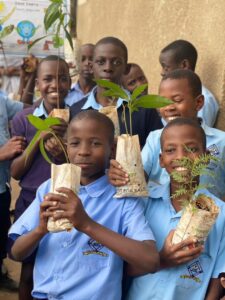
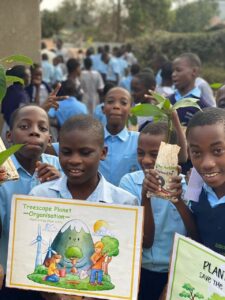
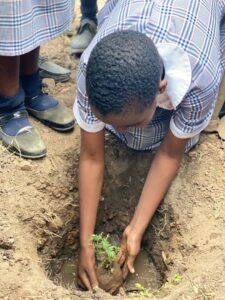
We’ve all heard the saying, “The way to a person’s heart is through their stomach.” The way to the heart of some of society’s most urgent problems, such as environmental destruction and income inequality, is also through food.
From farm to fork, our tree-food production has a significant impact on the livelihoods of people and places around our communities. Remember, sharing nutritious food is not just a hand-out at Treescape Organization, it’s recognizing someone’s common humanity.
As we all know, farming is a common language. Everyone eats, which means a diverse range of stakeholders, from producers to businesspeople, lawyers, and activists, have a part in promoting more sustainable food production which promotes environmental conservation.
With this action of combined efforts, these ecologically sustainable, local and community-based fruits not only support their own producers, societies, and the environment but also supports science.
As we spread the regenerative agriculture framework to indigenous communities, we return an inspiration to the beginning, young, and family farmers who maintain hope that “what they are doing can be scalable,”.
This is where we like to begin our work with others, asking farmers what motivates them to be a farmer in the first place.
Treescape planet Organization works with communities to exercise agroforestry. Agroforestry-the use of trees in farming-benefits both farmers and the environment.
According to a recent report by Biodiversity International, the Center for International Forestry Research, the World Agroforestry Centre, forests contribute to the livelihoods of more than 1.6 billion people.
Yet, 30 percent of the world’s forests are used primarily for the production of wood products. Agroforestry is defined as the integration of trees and shrubs into crop and animal farming systems.
These practices can help landowners diversify products and create social, economic, and environmental benefits.
Treescape planet Organization works with communities to exercise agroforestry. Agroforestry-the use of trees in farming-benefits both farmers and the environment.
According to a recent report by Biodiversity International, the Center for International Forestry Research, the World Agroforestry Centre, forests contribute to the livelihoods of more than 1.6 billion people. Yet, 30 percent of the world’s forests are used primarily for the production of wood products.
Agroforestry is defined as the integration of trees and shrubs into crop and animal farming systems. These practices can help landowners diversify products and create social, economic, and environmental benefits.
trees and forests provide more than just food—they can enhance soils, protect biodiversity, preserve precious water supplies, and even help reduce the impacts of climate change. by planting food-bearing trees and other trees, tpo recognizes that edible trees simply aren’t utilized to their maximum potential; while over 20,000 edible tree species exist, fewer than 20 species provide the majority of food worldwide. trees that feed promotes biodiversity while providing nourishment for people, creating jobs, and benefiting the environment.
the tpo recognized the role that trees can play in feeding a community and discovered an opportunity to a meliorate the situation of hungry communities. tpo also realized the crucial function of trees as carbon sequestration sinks and soil conservation resources, meaning they can act to mitigate climate change.
the tpo’s crops are versatile, and can be grown by small farmers, on field margins, and even in urban centres. certain trees can additionally act as a support network for smaller understory plants, such as coffee, mangos, and avocado. this has been exercised with communities in lwetunga kapeeka sub county, nakaseke district in uganda.
Food-service operations in schools, hospitals, universities, businesses and restaurants supply nearly half of all meals in the Country. By redirecting their massive purchasing power, these food establishments have a huge opportunity to help us transition to a healthier, more sustainable, and equitable food system.
What is climate-friendly food service? Healthy, climate-friendly food service achieves a lower carbon and water footprint than traditional food service by offering a wider array of healthy, plant-based and plant-forward foods.
It also cuts emissions by reducing overall food and packaging waste, sourcing from farms that use carbon-enhancing, healthy soil practices and implementing recycling and other energy and water-saving measures.
Climate-friendly food also supports public health goals and has the potential to save lives and billions of dollars in healthcare costs. There is widespread consensus amongst public health organizations that eating less meat, especially processed and red meats, can reduce the risk of diet-related illnesses such as heart disease, cancer, and diabetes.
Small daily environmental conservation actions can have a huge impact on sustainability. Treescape Planet is working with a mission of making this world greener than how we found it. For years, Treescape Planet Organization, along with communities and its volunteers, is planting and nurturing trees in Uganda.
We can do more together than we can alone. The expertise and support we provide help businesses, individuals, and environmental partners directly work together to deliver greater impact.
Treescape Planet has long worked with Indigenous groups to empower their voices and advocate for the protection and conservation of their environment. Our Organization and network create opportunities for collaboration, learning and inspired storytelling that makes environmental giving easier, smarter, and more accessible to all.
New visitors might not be able to understand the impact of planting trees right away. Still, people who are regular visitors to Treescape Planet action locations can recognize the change in the place because of the trees we have planted.
Not only does planting trees impact Carbon sequestration, Biodiversity, Soil conservation, Air quality, and water conservation, but it also has many more positive environmental impacts and is an important step in promoting sustainability and preserving the natural environment.